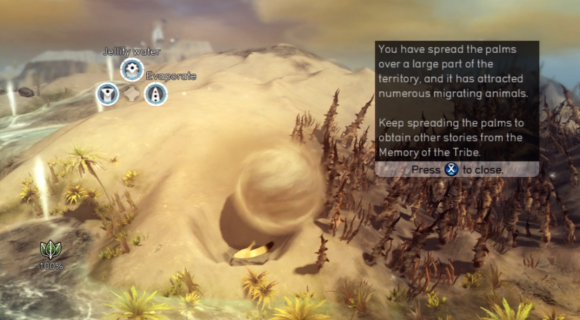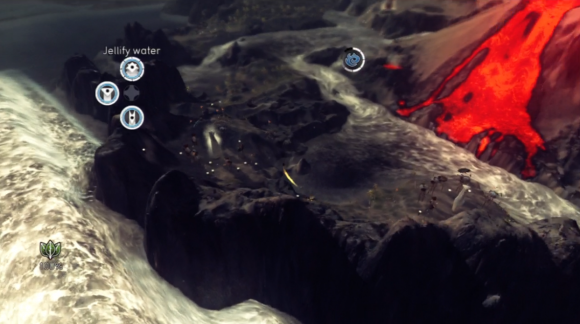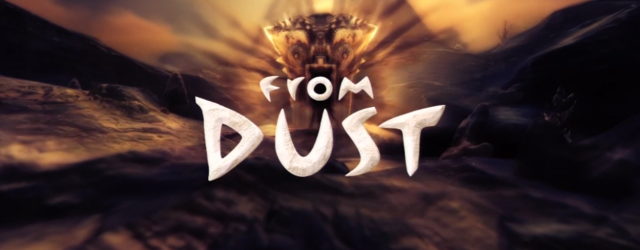From Dust is a game about consequences. I reached this conclusion around the time that I completed its fifth level, ‘The Thousand Sources’.
The clue is in the name, but first let’s explain a bit of From Dust’s nomenclature and concepts. Sources produce endless quantities of one of the game’s substances: water sources produce water and also carry small amounts of earth (gently explained in the second level through the formation of harmless tributaries below the area’s only water source) and lava sources produce rivers of molten rock that harden when exposed to water or when not surrounded by more lava.
When you begin ‘The Thousand Sources’ you are confronted with a glaringly bright expanse of desert, punctuated by small forests of ‘prickly’–tough vegetation impassable to villagers–and a small lake fed by several water sources. Initially you focus upon ‘capturing’ totems around which villages are constructed, lending you the powers of the Breath: you can always pick up and drop quantities of most substances, but it is through these totemic powers that you truly reshape the land and meet the objectives of a level. At first it seems that your largest problems will be in encouraging the spread of vegetation (by manually irrigating the desert) and working out how to remove forests of prickly.
Then, whilst innocently collecting some earth, you uncover a water source. This seems useful; it will help you spread the vegetation. Then you find another. And another. And another. Soon, what began as a barren desert is awash with water, the landscape carved into broad furrows as relentless torrents of liquid batter it. You find yourself desperately fighting to temporarily plug sources in order to make a safe path for your villagers to follow; only they can capture totems and activate the other landmarks that must be reached. Eventually, perhaps losing a village to flooding and having to rebuild it behind a new and improved flood barrier, you complete the level.

After I’d reached this point I sat back for a few moments, firstly to let myself calm down–the adrenaline pumping through me conveniently analogous to the rivers that had carved apart the level’s desert landscape–and secondly to contemplate on what I’d just played through. I was impressed–and charmed–by how well the game had engendered a set of expectations in me as a player and then subverted them. But more than that, I had experienced the level in the manner just described, but would someone else? Do the sources burst out eventually, or is it only through careless landscaping that they are revealed? What shape would another player’s world take?
This is a powerful aspect of From Dust. All of the choices you make, the ways in which you reshape the world, will have impact upon something else. This may be immediate or it may only transpire later. For example, diverting a river to allow your villagers safe passage may result in problems reaching another area; building a protective wall of rock in order to protect a village may channel a flow of lava elsewhere, perhaps toward some vegetation which will catch light, spreading wildfire across the land. The game is built around the idea that both the landscape and the way in which you interact with it must function as a double-edged sword: god giveth, god taketh away… sometimes without intending to.

This is a strangely gratifying experience. The game teaches you harsh lessons but encourages you to recognise that sometimes the harshness is the product of your own lack of thought. Besides, if it weren’t for that tough love the following level might burn you twice as hard.
Several core principles are consistent throughout From Dust, but the way in which they are applied is consistently varied: each level of the game ups the ante, turning about your expectations concerning danger and reward. It feels like some time since I played a game which so intelligently integrates its core concepts into its design and gameplay.
This is not to argue that it is a perfect game; far from it. Despite the intuitive nature of the controls and the way you interact with the world–one trigger to pick up, another to drop, one button press to send your villagers to a destination and powers mapped to the d-pad–precisely positioning your cursor can be a pain. This is particularly awkward in some of the challenge mode levels (essentially short bursts of play to test how well you grasp one particular gameplay element). Similarly, the path-finding of your villagers leads something to be desired, as does their ability to climb slopes. When you’re short on substances with which to build a handy ramp it can be deeply frustrating to see a villager stop in front of a five-foot climb and demand your divine assistance.
It’s also worth noting that the game is rather short. I completed the campaign in perhaps six or seven hours total, and that includes completing the bonus objectives for all levels. The aforementioned challenges extend gameplay somewhat, but they are less about manipulating landscapes–the fun stuff–and more about confirming that you know certain tricks that the game allows you to take advantage of (for example, dumping water on a villager to get them downhill quickly, then picking up the water to save them from drowning). Fans of achievements will find more longevity, though; there’s an achievement for completing the game losing less than five villages, and that is near-impossible while you’re still learning how to play.

Oh, and just to tick a few other boxes, as I feel I must in every review: there’s an inconsequential but nicely presented plot, about which the best thing that can be said is that the denouement is cleverly cyclical if under-developed, and the audio works brilliantly. There is music but it’s understated, presumably because audio cues are so very important here. (Ah, the sound of screaming villagers and crackling. Evidently I have neglected to put out a fire.) The game is something of a visual treat, too, and I’m quite happy to share the fact that when I first saw a tsunami sweeping around a village that was protected from water–the waves breaking to form a two-hundred foot cylinder of furious water around it–I broke into a shit-eating grin. Aside from such moments of spectacle the visual design is well thought-out, with graphical cues helping you to make the quick, intuitive decisions the game demands of you.
It’s an all-round well-polished package, that’s what it is, and for once we have a slick and cleverly designed game that is also fascinating and unique. You’ll no doubt experience moments of frustration while playing it, and once you reach the end of the story you may be forgiven for raising an eyebrow so far that it bifurcates your forehead and shoots into the stratosphere, but none of this stops From Dust from being an extremely interesting, fun and immersive experience.

Right little man, just join your fellows near that totem and daddy can get the Infinite Earth ability.
No, don’t go there you silly little man. Yes, I know you are stuck. If you had walked along that ridge over there instead of through that valley then the water wouldn’t have broken all around you and left you stranded on an island.
Will you stop yelling “fuck me” every two seconds? I just have to find some earth to help y- SHUT UP ALREADY.
Now, to find some earth near this lake. Shit, picked up water instead. Drop the water, now pick up the eart- NO, that is still water. Bloody thing. When these people resurrected me I assumed it was going to be all shits and giggles, you know, music and magic.
WILL YOU STOP SHOUTING, I AM GETTING YOU HELP!
Right, there you go.
Now what’s your problem? Yes, I understand it is a bit steep bu- oh great, the water has washed it away. Fine. I’m going to evaporate all the water instead. I am the awesome and all powerful Breath! Behold and fear my ability to shape the land.
Wait, where are you going now little man? Don’t go towards that forest!
Fantastic. Yes, the forest was on fire because it was near some lava. And now you are on fire too. What’s that? Help you? No, I shan’t. Tough.
Oh all right. I love you little fuckers, so yes I’ll restart the map and try again, because you know what? You’re worth it, and so am I.



Comments
4 responses to “Review: From Dust (XBLA)”
From Dust is something I look forward to playing! I had read a few reviews that put a bit of doubt in my mind but you've totally managed to re-coup my interest in the game!
One thing worth noting is that the PC version is best approached cautiously. I've read that Ubisoft have removed their ridiculous DRM from the game, but I'm unsure if the technical issues caused by poor porting have been resolved.
It's a great little game so hopefully it's been given the TLC it deserves so that PC-only gamers can enjoy it too.
Hmm, yeah I just looked up PC port issues and there is more than just the DRM issue, which doesn't grind my gears as much as most people. But the other issues with controls and lack of changeable settings is slightly discouraging.
All in all I don't think those issues are a good enough reason to prevent me from picking it up!
Yeah, despite the control issues I still really, really enjoyed From Dust. It is easily my favourite of the Summer of Arcade titles.